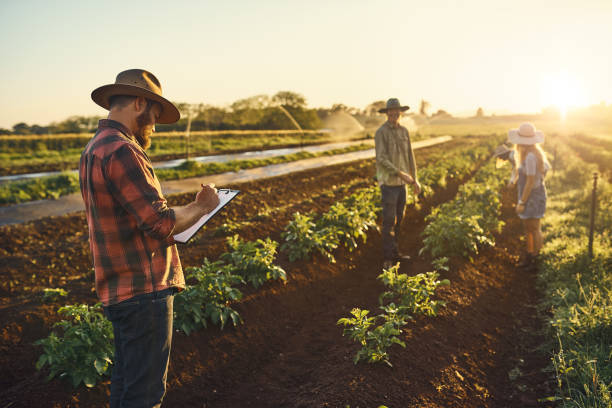What You Need to Know About Colorado's Farmland's Appreciating Value
As property prices in Colorado climb significantly, there are numerous reasons for ambitious investors to invest in the land market. In addition to a growing demand for agricultural products and improved agricultural techniques, excellent weather conditions also contribute to the value of land. Those considering land investments may profit from land loans, which provide additional purchasing flexibility for land.
Prospective investors should investigate the specifics of land loans and the qualities of each piece of property they intend to acquire. By carefully examining these factors, astute investors can take advantage of this developing agricultural state and make smart investment selections.
Value Analysis of Colorado Agricultural Land
The agricultural business in Colorado stands apart from the rest of the country, with agricultural land encompassing roughly 17 million acres and constituting almost one-quarter of the state's total area. This agricultural area is accessible through county roads, many of which were repaired using agricultural revitalization funds from the Colorado Department of Agriculture. It's no surprise that the agriculture sector generates more than $5 billion in annual revenue, a figure that continues to rise as farmers and ranchers across the state collaborate to ensure that their goods may be cultivated with dignity and efficiency.

Aspects Influencing Farm Land Value
Purchasing agricultural land is a difficult and expensive decision. Therefore, purchasers must comprehend the aspects influencing the worth of farmland. Primarily, these include location, soil fertility and quality, access to water sources, the availability of infrastructure such as roads and power lines, the market demand for crops produced on the land, the availability of nearby labor forces, and zoning regulations that could restrict farming activities on specific parcels of land. When purchasing agricultural land in Colorado, for instance, farms are frequently required to be located near a county road to prevent delivery vehicles from interfering with agricultural operations.
Before investing in agricultural land, it is crucial to determine whether or not these requirements exist in a certain area. Before making a decision, it is always prudent to conduct research to ensure that you pick the best possible choice.
Trends in the Colorado Farm Land Market
As market trends shift away from conventional agricultural operations and toward very lucrative organic farming and real estate development, the value of farmland in Colorado rises. Recent government statistics indicate that the combined market value of Colorado's agricultural land is increasing at a consistent rate, suggesting that this trend is likely to continue. Due to the surge in demand for agricultural property caused by these more lucrative ventures, the state provides the ideal investment opportunity for those seeking to acquire farmland at a premium price.
Utilization of Agricultural Products
The state of Colorado is renowned for its abundant agricultural output, which includes corn, hay, and wheat. In recent years, because of a growing worldwide population, the demand for these principal crops has increased dramatically, and this has had a direct effect on the value of farmland throughout Colorado.
Counties like Weld, Elbert, and Baca are among the most preferred areas for farms in Colorado due to their high-quality soil and agreeable climate. With a high boost in demand, these places have seen property values continue to improve as people are ready to spend more in agricultural properties. This tendency shows no signs of abating in the near future, reinforcing its standing as a valued asset.
Cost of Farmland Development in Colorado
When calculating the average price of farms for sale in Colorado, prospective purchasers must take into consideration fees in addition to the purchase price. It can be expensive to develop land by excavating, grading, and taking other procedures to transform it from undeveloped land.
Depending on the size of the property and the amount of work required to bring it up to par, these additional expenditures can add up rapidly and should be factored into a buyer's farmland investment budget. Therefore, it is essential to include these costs in addition to the quoted purchase price to avoid unpleasant surprises in the future.
Enhanced Agricultural Methods
The agriculture industry in Colorado is thriving, and farmland prices are on the increase. Improved agricultural technologies that have changed the game for farmers across the state are the key to success. By employing more effective methods, farmers now have access to harvests of higher quality and greater profit potential.
This transition has resulted in a rise in the value of farmland in Colorado, with smaller farmers benefiting most from improved productivity, revenue, and net worth. It appears that farmland prices will continue to rise as these more advanced farming techniques become the norm for the future.
Favorable Meteorological Conditions
Colorado, a state in the Rocky Mountains, has become a refuge for productive crop harvests due to its warm climate and abundant rainfall. This combination of favorable meteorological conditions supports the optimal growth of numerous fruits, vegetables, and grains, resulting in greater harvests, greater earnings for farmers, and an overall better harvest. Due to these excellent conditions, it is not surprising that the value of farmland in Colorado has climbed dramatically. Those wishing to invest in real estate or make a career transition into agriculture may want to consider acquiring farmland in Colorado.
Impact of Regulations on Farm Land Value
Colorado’s Department of Agriculture is responsible for overseeing Colorado’s vibrant agricultural landscape, and as such, it can have a considerable effect on Colorado farmland prices. From zoning compliance to taxation and other legal obligations, Colorado purchasers must be aware of the numerous market-affecting restrictions.
This information not only equips you to potentially negotiate a better price, but also prepares you for any potential financial dangers involved with farmland investments in Colorado. Understanding the action-oriented approach of the Colorado Department of Agriculture to legislation and changing market trends will give you the edge you need to expand your farm operation or secure a sound investment in Colorado farmland in this competitive market.

Accessibility to Land
It is reasonable for investors to be interested in farmland in Colorado, given the state's reputation for agricultural productivity. However, prospective purchasers should be aware that the supply of land for sale in Colorado can be severely limited.
Access to suitable land for sale may be limited, and due to local interest and other considerations, the available pieces of land may not fulfill certain criteria, such as budget or location. This is a significant issue for prospective purchasers, who may find themselves without a viable buying option if they do not investigate the land options beforehand.
Options for Colorado Farmland Loans
Investing in farmland might be a wise choice, but before taking the leap, it is essential to investigate the available lending choices. Potential purchasers frequently use government-backed and private loans to purchase land and finance development expenditures. Knowing the specifics of these loans, such as interest rates, payment plans, and term duration, is essential for making an informed choice. Ensure that you investigate all of your loan possibilities so that you may benefit from this valuable resource!
Investment Benefits of Colorado Farm Land
There are numerous benefits to investing in Colorado farmland. These benefits include the potential for substantial returns, the opportunity to expand current activities, and access to the state's natural beauty. When contemplating an investment in the Colorado farmland market, potential buyers should carefully assess these benefits.
Risks Associated with Farmland Investments in Colorado
As with any investment, there are dangers associated with investing in farmland in Colorado. These risks include the possibility of commodity price variations, weather conditions shifting, and regulatory changes. Before making a decision, prospective purchasers will want to thoroughly assess all possible dangers.
Locating the Ideal Farmland
When searching for the ideal piece of farmland, prospective purchasers must take a number of search parameters into account. Important factors to consider include the required size of land, the desired location, and the cost. However, it is also essential to thoroughly investigate any limits or rules that may be tied to the land, as zoning laws and taxes have a significant impact on the ranch's usability. In order to find the ideal piece of land for their purposes, prospective buyers should approach their search with thoroughness and accuracy.
Due to the rising value of the land and the possibility for high profits, investing in Colorado farmland is an enticing option for many prospective buyers. However, prospective purchasers must be aware of the different elements that influence the value of the property, such as the demand for agricultural products, improved farming practices, and pleasant weather. Before making a selection, prospective buyers must also examine the cost of development and other potential dangers. Potential purchasers can make an informed decision about whether to invest in Colorado farmland and reap the potential returns by studying all of these elements.
If you're interested to have more knowledge about this topic, feel free read this blog post from Farm Plus Financial.

